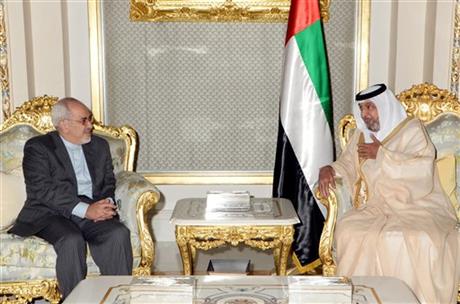
By ADAM SCHRECK
This image released by the Emirates News Agency, WAM, shows UAE president Sheikh Khalifa bin Zayed Al Nahyan, right, meeting with the Iranian foreign minister, Mohammad Javad Zarif in Abu Dhabi, United Arab Emirates, Wednesday, Dec. 4, 2013. (AP Photo/WAM)
DUBAI, United Arab Emirates (AP) — Iran pressed on with a charm offensive in the Gulf on Wednesday, as Tehran’s top diplomat headed to the United Arab Emirates for talks with the nation’s leader in his latest visit to the Islamic Republic’s Arab neighbors.
Iran has a strained relationship with the U.S.-allied Gulf states, particularly regional rival Saudi Arabia. The Islamic Republic’s new government, led by moderate President Hassan Rouhani, has promised to work to improve ties with nearby Arab countries.
The outreach campaign appears to be working so far.
Iranian Foreign Minister Mohammad Javad Zarif’s visit to the UAE, home to the Mideast commercial hub of Dubai and the oil-rich emirate of Abu Dhabi, was his fourth to a Gulf nation just this week. Zarif held talks with the seven-state federation’s president, Sheik Khalifa bin Zayed Al Nahyan, in the Emirati oasis city of Al Ain.
During their meeting, the Emirati leader reiterated his country’s support for Tehran’s decision last month to freeze parts of its nuclear program in return for an easing of Western sanctions. Khalifa also said his nation looks forward to enhancing regional stability and security, and hopes to boost bilateral cooperation, according to an account of their meeting carried by the official WAM news agency.
The two OPEC nations have longstanding trade ties but differ over several issues, including Tehran’s control over Gulf islands claimed by both countries.
The UAE nonetheless has shown a willingness to engage with the new Iranian leadership. It was one of the first countries in the region to welcome last month’s nuclear deal between Iran and world powers, and dispatched its foreign minister to Tehran last week.
The West and its allies fear that Iran’s program could be used to build an atomic bomb. Iran says it is only for peaceful purposes, such as producing electricity, and for scientific and medical research.
The UAE has embarked on its own nuclear program, last year becoming the first country in more than two and a half decades to begin building its maiden atomic power plant. It, however, has agreed with the U.S. not to enrich uranium or reprocess spent fuel for plutonium, which can be used in nuclear bombs.
Earlier this week, Zarif traveled to Kuwait, where he met with that country’s ruling emir.
He then stopped in Oman, which shares control of the Strait of Hormuz at the mouth of the Gulf with Iran. It has long maintained friendly ties with both Tehran and the West, and was the site of some of the secret talks between Iranian and American representatives that preceded last month’s nuclear deal in Geneva.
Zarif also paid a visit this week to Qatar and met with that country’s ruler.



